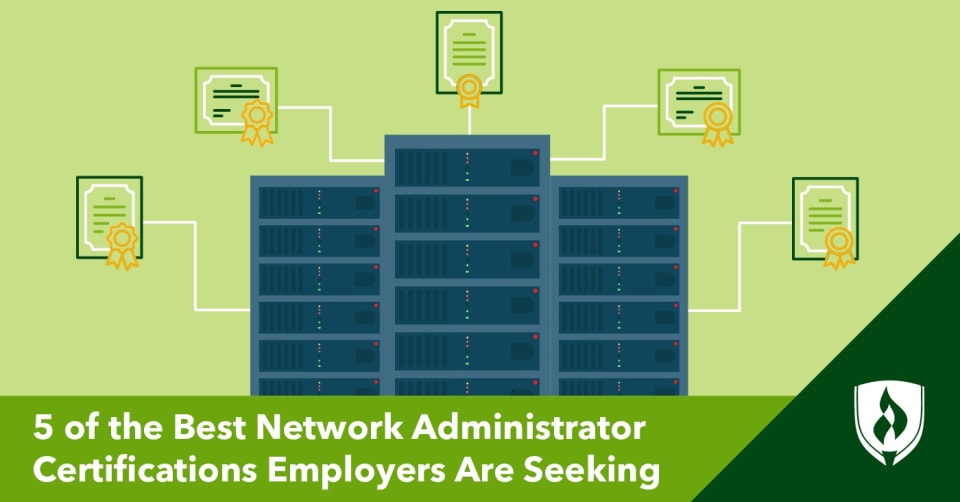5 of the Best Network Administrator Certifications Employers Are Seeking
By Carrie Mesrobian on 09/27/2021

You’ve done your research, narrowed down your options and are about to pursue a field that you are passionate about. Whether you have decided on becoming a network administrator as your ultimate goal or have it in your top options among IT roles, you’re getting closer to beginning a new career.
You also know earning a college degree is a great way to break into the industry, but you’ve likely noticed that some job postings also seek out candidates with professional certifications as well. While figuring out which programs align with a network administrator role is pretty straightforward, sorting out which certifications to pursue can be somewhat confusing.
To help, we’ve narrowed the field down to five of the best network administrator certificates that will help you stand out to employers. Additionally, we’ve talked to experts in the industry about what they look for when hiring network administrators, so you have the most up-to-date information.
5 of the best certifications for future network administrators to consider
While every job position will vary in specific requirements, a solid educational foundation in combination with any of the following certifications can help position you for success.
1. CompTIA A+®
What is it? Considered an industry standard for any new IT professional, the CompTIA A+ certification ensures a baseline of technical skills useful for a variety of IT roles. Divided into two parts, this certification covers the basics of network administration computer repair, software, operating systems, cloud computing, information security and troubleshooting devices. Many of the other CompTIA certifications build off of the A+ certification’s foundation, so IT professionals are recommended to begin here.
Certification process: The A+ exam consists of a maximum 90 mixed questions—some are multiple choice, while others are performance-based. The exam lasts 90 minutes and it is recommended to have 9–12 months experience in the lab or field to prepare.
2. CompTIA Network+®
What is it? CompTIA Network+ certification is for IT professionals to solidify their skills and expertise in complex computer networks. The exam covers topics such as troubleshooting of network devices and the configuration and management of both wired and wireless devices. In-demand focus areas such as cloud and virtualization technologies are also covered.
Certification process: This intermediate-level exam is recommended for those with at least nine months of networking experience as well as the CompTIA A+ certification. The exam consists of a maximum 90 questions—both multiple choice and performance-based.
3. CompTIA Security+®
What is it? Even if you have no intention of pursuing a specialized information security career path down the line, anyone hoping for a career in IT should at least consider the CompTIA Security+ certification. This global certification, which is approved by the U.S. Department of Defense, reinforces skills in areas such as recognizing and responding to risks and threats, installing and configuring secure applications and networks and understanding up-to-date security and safety laws and regulations.
Certification process: Like the other CompTIA certifications listed above, anyone is eligible to take this certification exam. That being said, CompTIA recommends exam takers to have at least two years of experience in IT as well as a Network+ certification. The exam itself is 90 questions, with both multiple choice and performance-based questions.
4. Cisco CCNA®
What is it? The Cisco CCNA, or Cisco Certified Network Associate certification, demonstrates a higher level of network knowledge to employers. The exam covers basics like network access, IP connectivity and services, security fundamentals and automation, and programmability.
Certification process: The Cisco CCNA has no prerequisites and is timed at 120 minutes. It’s suggested that CCNA candidates have 1+ years of experience in the field, as well as a good understanding of IP addressing and network fundamentals.
5. Microsoft® 365 Certified: Modern Desktop Administrator Associate
What is it? The Modern Desktop Administrator Associate certification has two parts and measures your ability to deploy and maintain Windows, upgrade operating systems, protect and manage devices, data and apps, configure storage and connectivity and manage policies and profiles.
Certification process: This certification begins with the MD-100: Windows 10 exam, and candidates should be familiar with Microsoft 365 workloads, configuration, deployment and maintenance. The second part of this certification is the Managing Modern Desktops exam, which is recommended for candidates who are already working as administrators.
Are certifications worth it?
While a degree program can teach you many of the hard and soft skills you need to obtain an entry-level job in information technology, these certifications show employers that you’re dedicated to mastering critical networking skills as you develop in your career. Many of these certifications need to be renewed every few years, so having one or more on your resume also shows that you are invested in staying up to date with the latest best practices in the field.
John Li, CTO of FigTech, recommends aspiring network administrators get experience with multiple network environments.
“Get your hands on as many networks as you can,” Li says. “Knowing several coding languages will make you well suited for loads of admin jobs.”
While professional certifications are certainly a welcome addition to an IT professional’s resume, it’s also important to strike a balance between current job duties and continued learning and development.
Joost Dettmeijer, lead IT engineer at Vanderlande, advises network administrators to value their current environment, as keeping the network up and running is crucial to a business running smoothly.
“With anyone currently working as a network admin, the issue you have is within your current environment—there isn’t a lot of change,” Dettmeijer explains. “People want a stable network to work in.”
Set the foundation for your IT career
Now that you have more knowledge of some of the best professional certifications for network administrators, are you in a position to pursue them? One of the best ways to position yourself for success in the information technology field is to pursue both professional certifications and a formal college education. If you’re ready to start on the path to becoming a network administrator, check out the fully-online Network Support Certificate and Network Systems Administration Associate’s Degree programs at Rasmussen University.
Related Articles:
CompTIA, CompTIA A+, CompTIA Network+, CompTIA Security+ are registered trademarks of CompTIA Properties, LLC.
Cisco CCNA is a registered trademark of Cisco Technology, Inc.
Microsoft is a registered trademark of Microsoft, Inc.




